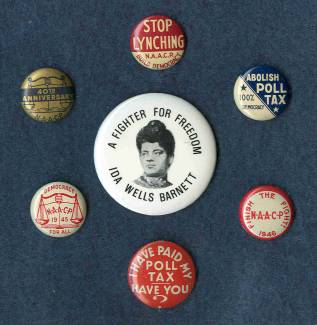Collection Name
About
The National Association for the Advancement of Colored People (NAACP) was founded on February 12, 1909. Originally known as the National Negro Committee, its multi-racial founders' primary purpose was to find ways to establish and promote social equality and secure for all people the rights identified within the 13th, 14th, and 15th Amendments to the United State Constitution.
The NAACP was a leader in the fight against lynching during the 1920s and 1930s. (Based upon research at Tuskegee University in Atlanta, Georgia there were over 4,700 documented/known lynchings, burnings, or fatal whippings in the United States. Twenty-seven of these were in Maryland.) The NAACP and also took up the struggle against job and educational discrimination throughout the 1940s and leading up to the present. Through the NAACP's Legal Defense and Educational Fund, Marylanders Thurgood Marshall (later a Supreme Court Justice) and Clarence M. Mitchell Jr. played a leading role in the 1954 Brown v Board of Education decision prohibiting segregation in public schools and the later 1964 Civil Rights and 1965 Voting Rights Acts.
The term Poll Tax is most closely identified as a tax required of people in order to vote. As it pertains to Civil Rights, it was used as a popular method in the South to prevent blacks and poor whites from voting. This discriminatory tax began to be levied after the passage of the 15th Amendment to the Constitution which gave the right to vote to all races. In 1964 the 24th Amendment outlawed the Poll Tax as a requirement for voting in Federal elections and in 1966 the Supreme Court stated that the Poll Tax violated the Equal Protection Clause of the 14th Amendment in State elections as well.
Ida Bell Wells-Barnett (1862-1931) was not only a school teacher, journalist, civil rights leader and anti-lynching activist, but also an advocate for women's rights and leader of the women's suffrage movement. As a young woman in 1884 while traveling by train in Memphis she was told to give up her seat to a white man and go to the "Jim Crow" smoking car. She refused and was physically removed from the train while the other passengers, all white, applauded. Wells sued the railroad company and though she won in the lower courts the decision was overturned on appeal by the railroad to the Tennessee Supreme Court. This early event served as a catalyst for her fight against injustice. She worked with William E. B. DuBois (1868-1963) in the Niagara Movement which had been founded in 1905 to fight racial segregation and disenfranchisement. Ida Wells Barnett was also one of the founding members of the NAACP in 1909.
